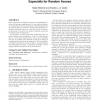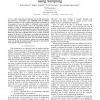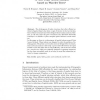22 search results - page 1 / 5 » Index compression is good, especially for random access |
CIKM
2007
Springer
13 years 11 months ago
2007
Springer
Index compression techniques are known to substantially decrease the storage requirements of a text retrieval system. As a side-effect, they may increase its retrieval performanc...
DCC
2010
IEEE
13 years 11 months ago
2010
IEEE
We introduce an alternative Lempel-Ziv text parsing, LZ-End, that converges to the entropy and in practice gets very close to LZ77. LZ-End forces sources to finish at the end of ...
ICDE
2010
IEEE
13 years 11 months ago
2010
IEEE
—Data compression techniques such as null suppression and dictionary compression are commonly used in today’s database systems. In order to effectively leverage compression, it...
DCC
2008
IEEE
14 years 4 months ago
2008
IEEE
Recent advances in compressed data structures have led to the new concept of self-indexing; it is possible to represent a sequence of symbols compressed in a form that enables fas...
ER
2009
Springer
13 years 11 months ago
2009
Springer
Abstract. The development of index structures that allow e
cient retrieval of spatial objects has been a topic of interest in the last decades. Most of these structures have been d...



